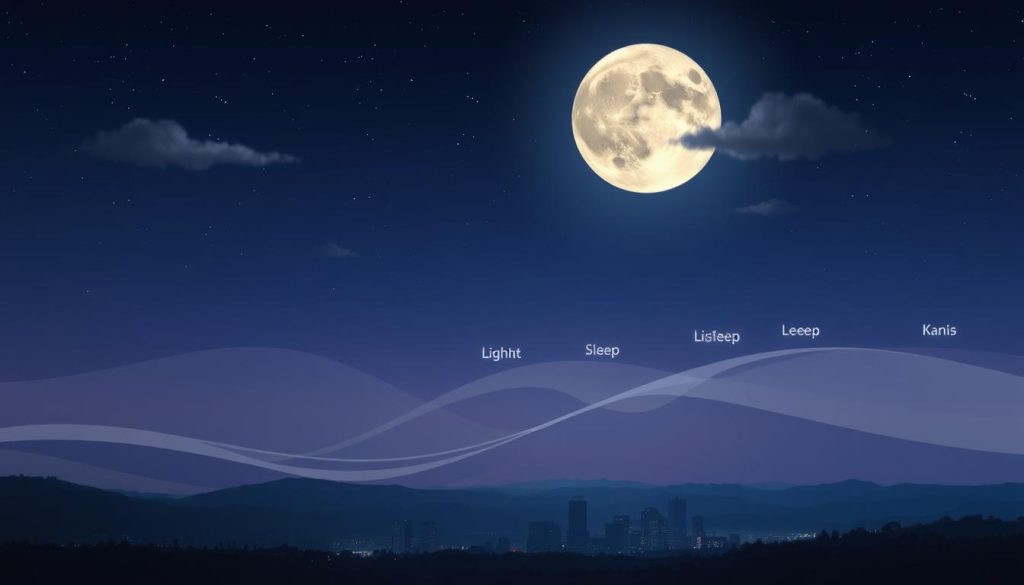Learning to balance my circadian rhythm with my work schedule is key to better health and productivity. By matching my daily activities with my natural body clock, I hope to sleep better and stay energized. This section will explain why this balance is so important, laying the groundwork for exploring how circadian rhythms affect my work life.
Understanding My Circadian Rhythm
Learning about my circadian rhythm is key to a better daily life. It’s my body’s internal clock that controls when I sleep and wake. It’s influenced by light and temperature, telling my body when to be active or rest.
What is Circadian Rhythm?
The circadian rhythm is vital for my body’s health. It manages my sleep, hormone levels, and even my mood. It works with the environment to keep my body running smoothly, making me more alert and efficient.
Why is Circadian Rhythm Important?
My circadian rhythm is very important for my health. It helps me stay mentally and physically fit. If it’s off, I might struggle with sleep, focus, and even my health in the long run. By listening to my body’s clock, I can do better in work, feel happier, and live better.
Identifying My Ideal Sleep Patterns
Discovering my ideal sleep patterns has changed my life. I found out that tracking my sleep habits gives me insights into how various factors impact my rest. By tracking my sleep, I can spot trends and make changes to improve my well-being.
Tracking My Sleep Habits
I started by keeping a sleep journal. This gave me a clear picture of my nightly routine. I also tried out sleep apps to get detailed analytics of my sleep. These tools helped me understand my sleep better.
I paid close attention to how I felt in the morning. This helped me see how good my sleep was and how it affected my energy levels.
Recognizing Sleep Cycles
Learning about sleep cycles has improved my sleep quality. Sleep has different stages, like light sleep, deep sleep, and REM sleep. Each stage is important for rest and recovery.
For example, deep sleep helps with physical healing. REM sleep is key for memory and emotional processing. Knowing about these cycles helps me sleep better.

To help others find their sleep patterns, I made a simple chart. It shows the different sleep stages. This chart can help anyone track their sleep and improve it:
| Sleep Stage | Duration (minutes) | Function |
|---|---|---|
| Light Sleep | 30-60 | Preparation for deeper stages and transition between wake and sleep |
| Deep Sleep | 20-40 | Physical recovery and growth; immune function support |
| REM Sleep | 20-25 | Memory consolidation and emotional processing |
By tracking my sleep and understanding sleep cycles, I keep improving my sleep. This is key for keeping my circadian rhythm and health in check.
Adjusting My Work Schedule for Optimal Performance
Finding the right balance in my work schedule has been key to boosting my productivity. Flexible work hours have made a big difference. I now align tasks with my natural energy peaks, changing how I work.
Flexible Hours and Productivity
Flexible work hours let me choose when to tackle tough tasks. When my energy is high, I tackle complex projects. This boosts my efficiency. A survey found that flexible hours increase productivity by 20%.
Here are some tips that help me stay productive:
- Identify peak energy times to schedule difficult tasks.
- Set specific hours for focused work to minimize distractions.
- Use tools like time-blocking to structure my flexible work hours.
The Role of Breaks in My Workday
Understanding the value of breaks is crucial for staying productive. Regular breaks help me stay focused and avoid burnout. Research shows that short breaks can refresh the mind and improve performance.
Here’s how I make breaks a part of my day:
| Time Interval | Activity | Purpose |
|---|---|---|
| Every 60 minutes | 5-minute stretch or walk | Boosts blood circulation and refreshes focus |
| Every 120 minutes | 15-minute coffee break | Utilizes caffeine to recharge and invigorate |
| After lengthy meetings | 10-minute meditation | Reduces stress and sharpens concentration |
By embracing flexible work hours and breaks, I’ve adjusted my schedule to fit my natural rhythm. This has led to better productivity.

Circadian Rhythm and Work Schedule: Finding Balance
Finding a balance between work and my natural rhythm has boosted my productivity. By working when it’s light outside, I feel more energetic and happy all day.
Aligning Work Hours with Natural Light
Natural light is key to keeping my internal clock in check. I’ve changed my workspace to get more daylight. Here’s how I did it:
- I moved my desk near windows to catch the sun.
- I take breaks outside to soak up the sun and fresh air.
- On cloudy days, I use lights that mimic the sun’s glow.
Strategies to Sync My Internal Clock with Work Demands
To keep my work and life in harmony, I’ve used smart strategies. These help me tackle tough tasks when I’m most alert:
- I use time-blocking to focus on important tasks.
- I schedule meetings when I’m most awake and ready.
- I adjust my work hours to match my natural energy highs.

Creating a Restful Sleep Environment
To get quality sleep, I worked on making my bedroom perfect for rest. I focused on removing distractions that could ruin my sleep. It’s key to keep the room dark and quiet for the best sleep.
Minimizing Light and Noise Distractions
Light and noise are big factors in a calm sleep space. I got blackout curtains to keep out outside light. This makes my room dark and helps me sleep deeper.
For noise, I used white noise machines. They make soft sounds that cover up loud noises. Keeping my room cool also helps me sleep better. A temperature between 60 and 67 degrees is ideal.
Choosing the Right Sleep Aids
I also looked into sleep aids to improve my bedtime routine. Melatonin supplements help my body know it’s time to sleep. Herbal teas like chamomile and valerian root also help me relax.
Here’s a table of sleep aids I found helpful:
| Sleep Aid | Description | Effectiveness |
|---|---|---|
| Melatonin | A hormone that regulates sleep-wake cycles | Effective for reducing time to sleep |
| Chamomile Tea | A herbal tea known for its calming properties | Promotes relaxation and sleep onset |
| Valerian Root | A herb that has sedative effects | May improve sleep quality |
Nutrition and My Circadian Rhythm
My quest for better sleep has shown a clear connection between what I eat and how well I sleep. It’s amazing how our diet and meal times can affect our rest and health. Eating heavy meals, especially those with lots of fats and sugars, can make it hard to sleep.
Caffeine and alcohol, which I sometimes enjoy, also mess with my sleep. They can keep me awake and disrupt my natural sleep cycle.
How Eating Affects My Sleep Quality
Learning about the link between diet and sleep has made me more careful with my food choices. Eating a balanced diet helps me sleep better. Foods high in complex carbs, magnesium, and tryptophan help my body make melatonin.
By eating nutrient-rich meals during the day, I support my body’s natural sleep patterns. It’s important to remember that bad nutrition can harm my mood, energy, and sleep.
Timing My Meals for Better Sleep
When I eat is also crucial for good sleep. Eating my last meal two to three hours before bed helps my body digest food better. This reduces discomfort when I go to sleep.
Staying away from big meals before bed and choosing lighter snacks helps. Eating at the same times every day helps my body get into a rhythm. This improves my sleep and makes me feel more refreshed.

